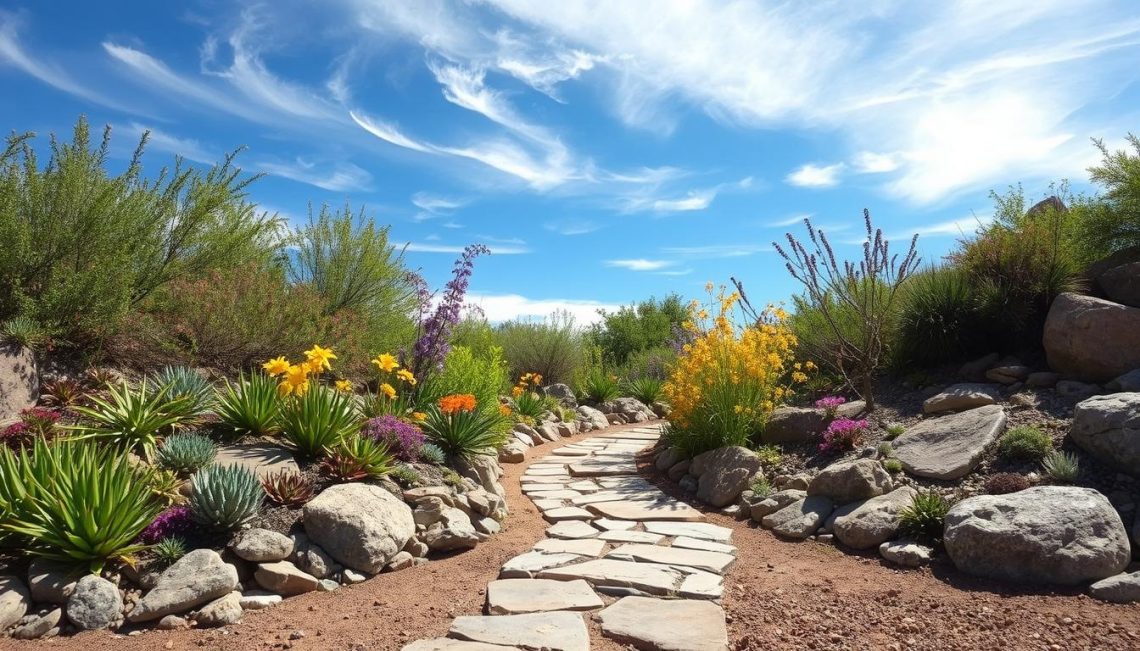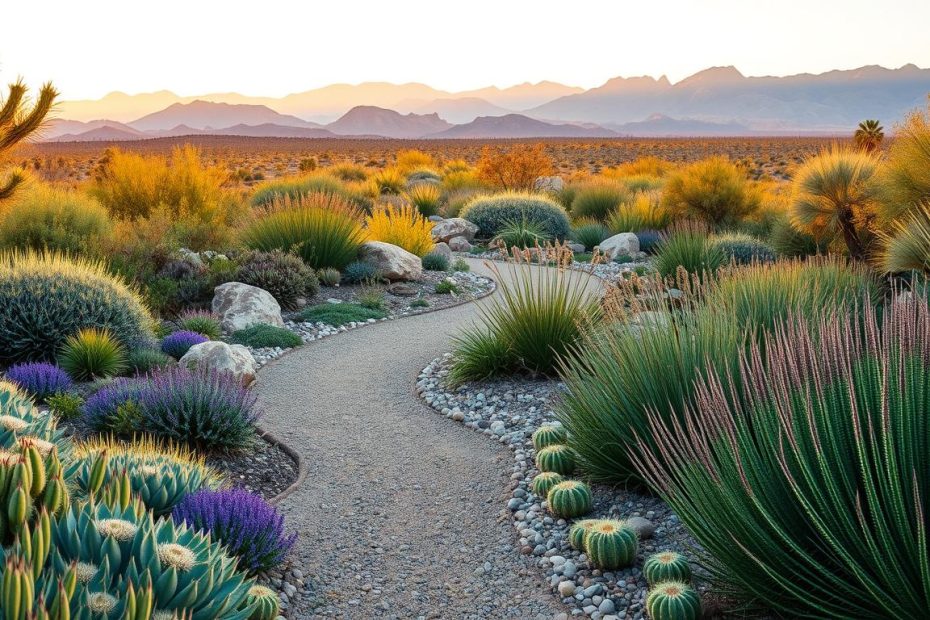Transforming your outdoor space into a beautiful, sustainable oasis is easier than you think. We’re excited to share our guide on creating a stunning garden that not only survives but thrives in dry conditions.
By incorporating drought tolerant landscaping techniques and water-wise gardening practices, you can significantly reduce your water consumption and maintenance efforts. Our goal is to provide you with practical advice and inspiration to create a low-maintenance outdoor space that is both environmentally friendly and visually appealing.
We’ll explore various techniques and plants that are perfect for dry conditions, helping you achieve a gorgeous and sustainable garden.
Why Choose Water-Wise Landscaping
As concern for the environment grows, water-wise landscaping emerges as a key strategy for homeowners looking to reduce their ecological footprint. This approach not only helps in conserving water but also reduces the economic burden of high water bills.
Environmental and Economic Benefits
Water-wise landscaping offers numerous benefits, both environmentally and economically. By reducing water consumption, homeowners can lower their water bills. Additionally, using drought-tolerant plants reduces the need for fertilizers and pesticides, creating a healthier environment.
“Xeriscaping can reduce water consumption by up to 50% compared to traditional landscaping methods.”
Climate Considerations for US Regions
Different regions in the US have unique climate conditions that affect landscaping choices. For instance, the arid West requires plants that are highly drought-tolerant, while the humid East can support plants that require more moisture.
| Region | Climate Considerations | Recommended Plants |
|---|---|---|
| Arid West | Low rainfall, high temperatures | Cacti, Succulents |
| Humid East | High rainfall, varied temperatures | Native grasses, Flowering plants |
12 Best Drought Tolerant Landscaping Ideas
Creating a beautiful and sustainable garden that thrives in dry conditions is now more achievable than ever with these 12 drought-tolerant landscaping ideas. As we explore these innovative solutions, you’ll discover how to transform your outdoor space into a stunning oasis that not only conserves water but also enhances your home’s appeal.
1. Replace Traditional Lawns with Native Grasses
Native grasses are a fantastic alternative to traditional lawns, requiring less water and maintenance. They are adapted to the local climate and soil conditions, making them more resilient to drought. By replacing your traditional lawn with native grasses, you can significantly reduce your water consumption.
“Native grasses offer a low-maintenance and eco-friendly solution for homeowners looking to reduce their environmental footprint,” says a landscape expert. This simple switch can make a significant difference in water conservation efforts.
2. Design a Rock Garden with Heat-Loving Plants
Rock gardens are not only visually appealing but also highly effective in dry conditions. By incorporating heat-loving plants, you can create a vibrant display that thrives in full sun. The strategic use of rocks and gravel helps to retain moisture in the soil.

3. Create a Striking Succulent Display
Succulents are renowned for their ability to store water, making them perfect for drought-tolerant landscaping. By arranging a variety of succulent species, you can create a striking display that adds texture and interest to your garden.
4. Install Permeable Pathways and Patios
Permeable pathways and patios are designed to allow rainwater to percolate through, reducing runoff and enhancing drainage. This not only helps to conserve water but also prevents erosion.
5. Develop a Mediterranean-Inspired Garden
Mediterranean-inspired gardens are characterized by their use of drought-tolerant plants, such as olive trees and lavender. By incorporating these plants into your garden, you can create a beautiful and sustainable outdoor space.
6. Incorporate Decorative Ornamental Grasses
Ornamental grasses add movement and texture to your garden, while requiring minimal water. They come in a variety of shapes and sizes, making them versatile for different landscaping designs.
7. Implement Xeriscape Design Principles
Xeriscape design focuses on water conservation through efficient irrigation systems and drought-tolerant plants. By implementing xeriscape principles, you can significantly reduce your water consumption.
8. Apply Strategic Mulching Techniques
Mulching helps to retain soil moisture, suppress weeds, and regulate soil temperature. By applying a layer of organic mulch, you can create a more sustainable garden environment.
9. Set Up Drip Irrigation Systems
Drip irrigation systems deliver water directly to the roots of plants, minimizing evaporation and runoff. This efficient irrigation method is ideal for drought-tolerant landscaping.
10. Plant Desert-Adapted Shade Trees
Desert-adapted shade trees, such as the mesquite tree, provide shade while being highly drought-tolerant. They are an excellent choice for creating a shaded area in your garden.
11. Arrange Water-Efficient Container Gardens
Container gardens offer flexibility and can be designed to be water-efficient. By using drought-tolerant plants and efficient irrigation systems, you can create a beautiful container garden.
12. Design a Functional Rain Garden
Rain gardens are designed to capture and filter rainwater, reducing stormwater runoff. By incorporating drought-tolerant plants, you can create a functional and beautiful rain garden.
By incorporating these 12 drought-tolerant landscaping ideas into your garden, you can create a stunning and sustainable outdoor space that not only conserves water but also enhances your home’s appeal.
Bringing Your Drought Tolerant Landscape to Life
We’re confident that you’re now equipped with the knowledge to create a beautiful and sustainable outdoor space. By adopting the 12 best drought-tolerant landscaping ideas, you’ll enhance the beauty of your garden while contributing to a more sustainable future.
To bring your drought-tolerant landscape to life, focus on implementing efficient design principles and maintenance practices. This will not only result in a low-maintenance outdoor space but also promote sustainable gardening practices.
Start planning your drought-tolerant garden today and enjoy the benefits of an environmentally friendly oasis. With the right plants and design, you’ll be able to conserve water and reduce your environmental impact.
